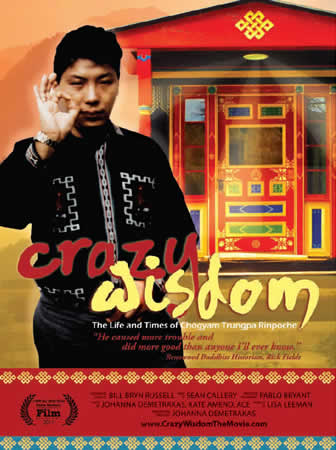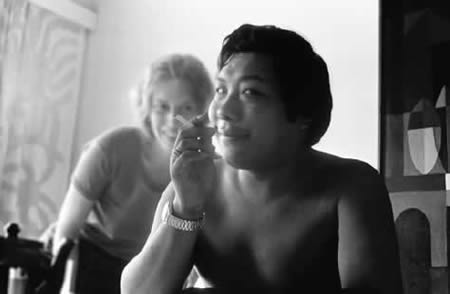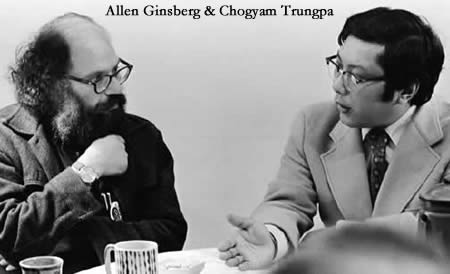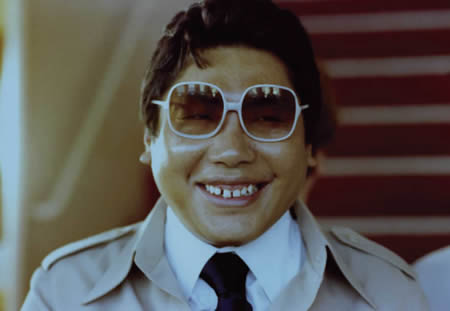 Crazy Wisdom, that had its world premire at Santa Barbara International Film Festival 2011, directed by Johanna Demetrakas is about the life and thinking of Chogyam Trungpa.
Crazy Wisdom, that had its world premire at Santa Barbara International Film Festival 2011, directed by Johanna Demetrakas is about the life and thinking of Chogyam Trungpa.
Chogyam Trungpa, the brilliant ‘bad boy of Buddhism,’ fled the invasion of Tibet, studied at Oxford, and shattered Westerners’ notions of how an enlightened teacher should behave.
Was it crazy wisdom when he renounced his monastic vows, eloped with a sixteen-year old aristocrat, openly drank alcohol, and had intimate relations with women students? Was it crazy wisdom when he founded a military order to dismantle aggression? Or was it when, to counter the materialism he saw infecting the world, he worked tirelessly to build an ‘enlightened society,’ based on compassion and courage?
The film presents a direct experience of Trungpa, and stories from his wife and students, including best-selling author Pema Chodron and poet Allen Ginsberg, as well as colleagues and critics like American guru Ram Dass and eminent scholar Robert Thurman.
We interviewed Johanna Demetrakas about making of the Crazy Wisdom. With her first documentary, Womanhouse, about a ground-breaking feminist art installation, Demetrakas won the AFI Independent Filmmakers Grant, a place in the Whitney Museum’s New American Filmmaker Series, and international recognition at festivals such as the Venice Biennale, Paris, and New York. Her second art doc, Right Out of History: The Making of Judy Chicago’s Dinner Party, was broadcast on PBS and the BBC after acclaim at the London and Berlin Film Festivals. Her art documentaries have been in many museum shows, including the major exhibit, “Los Angeles 1955 – 1985,” at the Pompidou Museum in Paris, 2006. The Pompidou recently bought a print of Womanhouse for their permanent collection. Since winning the Discovery Program Award and making the dramatic short Homesick in 1989 (Sundance, Houston Fest winner, Showtime broadcast), Demetrakas has turned her energies to writing and directing dramatic fiction as well as documentaries. Her credits include LA Law, Doogie Howser, MD, and the Lifetime television feature Out of Line, starring Jennifer Beals. In 2004, Demetrakas produced, directed, and edited a two-hour special Biography of Richard Gere for A&E. It was the first A&E Biography without a narrator.
art installation, Demetrakas won the AFI Independent Filmmakers Grant, a place in the Whitney Museum’s New American Filmmaker Series, and international recognition at festivals such as the Venice Biennale, Paris, and New York. Her second art doc, Right Out of History: The Making of Judy Chicago’s Dinner Party, was broadcast on PBS and the BBC after acclaim at the London and Berlin Film Festivals. Her art documentaries have been in many museum shows, including the major exhibit, “Los Angeles 1955 – 1985,” at the Pompidou Museum in Paris, 2006. The Pompidou recently bought a print of Womanhouse for their permanent collection. Since winning the Discovery Program Award and making the dramatic short Homesick in 1989 (Sundance, Houston Fest winner, Showtime broadcast), Demetrakas has turned her energies to writing and directing dramatic fiction as well as documentaries. Her credits include LA Law, Doogie Howser, MD, and the Lifetime television feature Out of Line, starring Jennifer Beals. In 2004, Demetrakas produced, directed, and edited a two-hour special Biography of Richard Gere for A&E. It was the first A&E Biography without a narrator.
Bijan Tehrani: Please tell us how you came up with the idea of Crazy Wisdom?
Joanna Demetrakas: I actually did study with Chongyam Rinpoche when he first came to America, I started with him in 1971 and he loved film, from the beginning I was able to relate with him and we were able to make several projects together. When he died,  People came from all over the world and they asked me to shoot a film of the cremation and I did; I thought then that I was going to make a film about this remarkable event. Years went by and I realized that that wasn’t it and I really wanted to make a film about the whole man and his influence and his incredible mind and how he brought a fresh way of thinking to us.
People came from all over the world and they asked me to shoot a film of the cremation and I did; I thought then that I was going to make a film about this remarkable event. Years went by and I realized that that wasn’t it and I really wanted to make a film about the whole man and his influence and his incredible mind and how he brought a fresh way of thinking to us.
BT: The younger generation might not be familiar with this story, how do you think that younger audiences will react to this film?
JD: One of the reasons that I made the film is because I feel that we are living in a dark age and I use some of his writings to explain this quagmire. We are all living with materialism, whether for fame or money or power. The generation of young people now are having a hard time because we are living in a very conservative and cynical time, so I hoped that what this film could do is open up their minds a little bit; when you are cynical there is only one way to think, but when you open you mind a little bit you expose yourself to so many different ideas, that is what Chongyam brought to us and that is what I wanted to show in the film.
 BT: How do you think Trungpa’s way of thinking influenced the different movements of the young people in 60’s America?
BT: How do you think Trungpa’s way of thinking influenced the different movements of the young people in 60’s America?
JD: In the 60’s the movements were about politics and then in the 70’s it stayed with politics but it also became a spiritual quest, like questioning the authority of your parent and their religion. Someone like myself and the way I grew up, not particularly hating or being against my religion, but I found myself looking for something more profound and real. One thing about Buddhism is that if you take a dictionary definition of the term religion, Buddhism qualifies, but Buddhism is more about the way of life and the experiences that you go through with your mind and your heart.
BT: Are there any of Trungpa’s followers who are able to continuing teaching his principles and still have an influence today like he did in his day?
JD: Pema Chodron was a student of Trungpa and she is constantly teaching directly from his teachings and his explorations. She has become an amazing figure and a wonderful writer and she is one of his most famous students. His eldest son who is leading the community now is also a very brilliant man. He is taking the work that Trungpa did and is running with it. Of course Alan Ginsberg went on to have much success as well. I know that there are people in the worlds of psychology and business who were also students of his. I also talked with Joni Mitchell, which did not make it into the film but she talks about some of her experiences with him.
 BT: How challenging was it to make Crazy Wisdom?
BT: How challenging was it to make Crazy Wisdom?
JD: It was challenging in two or three huge ways. First it was challenging to raise money for the film, the market for documentary films is much more about social issue films so a film like this is very difficult to raise money for. Another challenge was being in the presence of Trungpe. Being around him was like having a truck coming at you, suddenly you’re paying attention from every angle; when you are in the presence of someone like that it is very exhilarating and also very daunting. He is a very special kind of presence, he had girlfriends, he drank liquor and these are traits that many people could be turned off by. So the challenge was to make a film in which the audience would look past these traits and focus on the character.
BT: How did you come up with the visual style of the film?
JD: When you are making a documentary you have to put it together visually so that it is not just a bunch of people on camera talking. So with the photos and the stock footage we were able to portray his presence throughout the film, the images reflect his  life and his artistic side and help bring him to life more.
life and his artistic side and help bring him to life more.
BT: Are you planning any more projects on Trungpe?
JD: I want my next film to be about feminism, but I did get a lot out of the four years of film making and the 10 years of research, so whatever my next project is will not be rushed and will require a lot of thought, which is of course a very Buddhist approach.
BT: Are there currently any public screenings of the film?
JD: Not yet, we are going to the Santa Barbara film festival this weekend and then next weekend we are going to go the Boulder film festival. I am hoping at some point to have a screening in the Los Angeles area.
BT: Do you have any upcoming projects?
JD: The next project is one on feminism, when I first became a Buddhist I also became a feminist. Buddhism and Feminism are two very important paths in my life and I would like to explore them through film.

